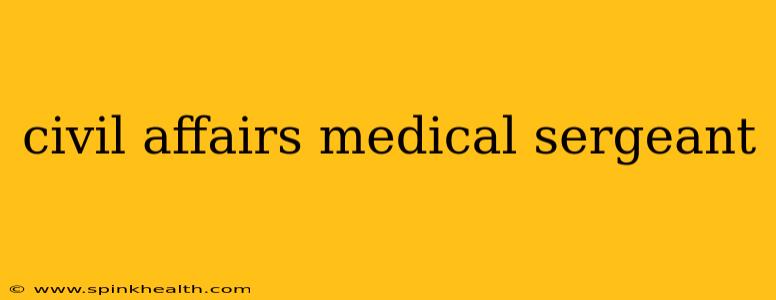The sun beats down on a dusty road in a far-off land. Dust devils dance in the shimmering heat, a stark contrast to the cool, organized calm within the medical tent. Inside, Sergeant First Class Maria Rodriguez, a Civil Affairs Medical Sergeant in the U.S. Army, meticulously cleans a wound. Her work isn't just about patching up injuries; it's about building bridges, fostering trust, and ensuring the health and well-being of a population caught in the throes of crisis. It’s a role that demands a unique blend of medical expertise, cultural sensitivity, and unwavering dedication.
This isn't your typical medic role. Maria isn't stationed at a forward operating base treating combat casualties. Her battlefield is the complex tapestry of human interaction, where a well-placed bandage can be as effective as a carefully crafted negotiation. She’s part of a larger Civil Affairs team, working alongside soldiers focused on governance, infrastructure, and community engagement. Their mission: to help stabilize the region and build a sustainable future. But how does a medical sergeant fit into all of this?
What Does a Civil Affairs Medical Sergeant Do?
Maria's days are a blend of the predictable and the unexpected. One moment she might be providing basic medical care – treating minor injuries, dispensing medications, and conducting health screenings. The next, she's coordinating with local health officials, translating medical information, and training local healthcare providers. Her skills are crucial for assessing the health needs of a community, identifying outbreaks, and implementing preventative measures. She's a vital link between the military and the civilian population.
What are the day-to-day tasks of a Civil Affairs Medical Sergeant?
The tasks vary drastically depending on the location and the specific mission. Some days might be spent in a clinic setting, offering routine care. Other days could involve accompanying patrols, providing immediate medical attention in the field, or teaching local medical personnel about advanced wound care. It’s all about adaptability and a willingness to embrace the unpredictable. Her training in medical treatment, coupled with her understanding of the operational environment, makes her an invaluable asset to the team.
What kind of medical training do Civil Affairs Medical Sergeants receive?
Civil Affairs Medical Sergeants undergo extensive training, building a solid foundation in both combat medic skills and civilian medical practices. They receive advanced training in primary care, preventative medicine, and public health. This ensures they can handle a wide range of medical situations, from treating battlefield injuries to managing health crises within communities. Their education extends beyond the purely medical, incorporating cultural awareness and language training—critical aspects of effective Civil Affairs operations.
How do I become a Civil Affairs Medical Sergeant?
Becoming a Civil Affairs Medical Sergeant requires commitment and dedication. It begins with joining the Army and completing basic training. From there, prospective candidates need to successfully complete advanced medical training, followed by rigorous Civil Affairs training. This involves not only mastering medical procedures but also developing skills in diplomacy, negotiation, and cross-cultural communication. It is a highly competitive field, demanding both high medical aptitude and a strong desire to serve in a unique and challenging role.
What are the required qualifications for a Civil Affairs Medical Sergeant?
The qualifications are stringent, emphasizing both medical expertise and the soft skills needed for effective cross-cultural communication. Strong leadership skills are also essential, as Civil Affairs Medical Sergeants often find themselves leading or mentoring local medical personnel. Physical fitness is a given, alongside an unwavering commitment to serving others, even in the most challenging circumstances.
The work is demanding, emotionally challenging, and often dangerous. But for Maria, and countless other Civil Affairs Medical Sergeants, the rewards far outweigh the risks. They witness firsthand the positive impact their work has on the lives of others, building a legacy that extends far beyond the battlefield. They are the silent healers, the quiet diplomats, building trust and healing communities, one patient, one interaction, one day at a time.

